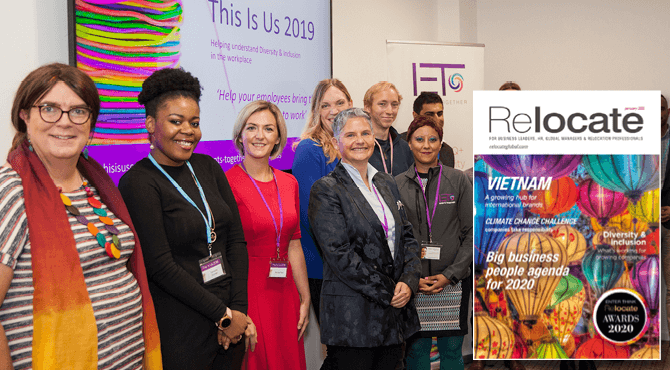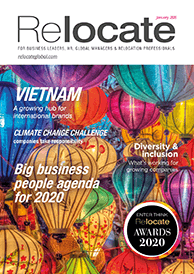Closing the closet door behind us: LGBTQ+ at work
It’s often not easy to be fully out at work if you are LGBTQ+. If you have come out to your employer, this can come at a personal and business cost. Studies show as well as ethnicity and gender pay gaps, people who are LGBTQ+ earn on average £6,700 a year less than their heterosexual colleagues.

This is us
Click on the cover to access the digital edition and order your printed copy.
Speakers at the second This Is Us conference held at the DoubleTree by Hilton Hotel in Milton Keynes on 7 October 2019, as well as recent research, shed valuable light on this aspect of diversity and inclusion. It is a topic that many in global mobility find one of the hardest to navigate given the often-challenging cultural and legal contexts in play around the world.Such insights are helping employers to decipher how to best attract, recruit, retain and progress people from a talent pool that truly reflects their whole customer base. Both the conference and the research highlight what employers and individuals can do to put policy into practice and build a fully supportive culture for everyone.
Into the world of work - but back into the closet?
Global research carried out by LGBTQ+ specialist advisory firm Out Now, commissioned by telecommunications company Vodafone, looked into people’s experiences of being out in their first career role after university.The study canvassed 3,194 LGBTQ+ people – 30 of them Vodaphone graduate recruits – from 18 countries. It asked them how easy or difficult it was to move into the world of work and be open about their sexuality. Among Out Now’s headline findings was the phenomenon it calls the “graduate closet”.A significant 41% of 18-25-year-old LGBTQ+ employees agreed with the statement, “I went back into the closet when I started my first job, despite being out in my personal life or at school/college/university.”Out Now also found a gender aspect to the findings. Only 29% of LGBTQ+ women aged 18-35-years-old feel able to be out to all at work. For male respondents, this figure is 44%.Multi-faceted insight for inclusion and diversity
For companies looking to drive their businesses forward amid a global talent squeeze, addressing these facts across the talent management lifecycle – including international assignments – is beneficial. This is both for graduate recruits and for LGBTQ+ people who are more advanced in their careers.The 2019 This Is Us conference looked through this lens to offer practical advice and testimonies for companies keen to do the right thing and get behind the business case for full inclusion and diversity.Do you want to help encourage a workforce where women thrive - and more? Come to our Think Women event on Women's Day 2020. Find out more.
Founder of This Is Us, Meena Chander (MSC) says, “Issues surrounding LGBTQ+ individuals within the workplace can have severe, ongoing effects. As leaders, we must address these issues and work together to create permanent solutions.”Amid the announcement of Home Office statistics showing that hate crime against people who identify as LGBTQ+ increased over the last year, and with the image of the empty open-top bus at 2018 Brighton’s Pride Parade set to transport Premier League footballers who are publicly out – a statistical anomaly – fresh in the minds of many, This Is Us creates a unique space to put LGBTQ+ at the heart of the inclusion and diversity conversation at work.
Attracting, recruiting and retaining LGBTQ+ talent
Former managing director of consultancy BAME Recruitment Ltd and founder of Doing Diversity Differently, Chico Chakravorty, kicked off the This is Us day-long programme. He offered advice to employers and employees alike that would help shift the dialogue and reduce the 31% of LGBTQ+ employees who felt uncomfortable in their workplace because of their sexuality, and the 24% who had experienced workplace bullying.Underpinning every aspect is making sure that everyone is included in the conversation and that there is congruency between the internal and external language. “Let’s have that discussion and make everyone realise how we can do things better,” he said.The Bank of England is one employer where good things are happening, according to Mr Chakravorty. Wanting to include people from diverse backgrounds, including LGBTQ+, the Bank of England recognized it didn’t know how, so enlisted help from outside of the organisation and is now feeling the benefits.Engagement and Inclusion
“When we feel represented, we lean into our organisation and our employer,” Mr Chakravorty continued. “Companies then have to put less effort into sales and recruitment, as people make their buying or employment choice. If you get it right, you don’t need to do much because it is natural messaging.”He also gave examples of where companies are getting it wrong and piecemeal, tokenistic approaches, such as “pink-washing.” Here, companies brand and market products in support of events and celebrations like Pride, but do not back this up in deeds.Instead, Mr Chakravorty encouraged employers, individuals and organisations to find or establish networks, both inside and outside their companies, and to give these a distinct purpose and goal to achieve. “How can your network connect with its community and others, locally, regionally, nationally and globally?” he asked, highlighting the value of senior sponsorship and personal investment.The role of allies
For Sanisha Wynter of Girlguiding UK, LGBTQ+ inclusion comes down to practical action as much as having a voice. “This is more than a lanyard,” said Ms Wynter, referencing workplace training and initiatives. “This is a practical thing. It’s active. If you’re not engaging, acknowledging or taking action, you aren’t doing anything. It’s about seeing humanity.” This involves allyship and “trying harder to say ‘I’m not going to tolerate this behaviour’. As allies, we have to put our heads above the parapet.”Download our free diversity and inclusion Global Mobility Toolkit factsheets
One tried-and-tested approach to this is through employer and workplace networks. “But only when they become more than a talking shop,” caveated Ms Wynter in the fireside chat with the conference’s host, Jacqui Gavin, civil servant and award-winning role model and public speaker on transgender and gender identity.The conversation with Ms Wynter, Tj Richards of Santander UK, Ata Rahman of Pride in London, Jamie Ades of Visit Britain, and Christopher Sharp of Racing Pride set out to clarify the role of LGBTQ+ networks and what they can achieve.For Mrs Richards, who is also national co-chair of Santander UK’s LGBTQ+ employee network, the starting point was to consider the role of privilege in the “vitriol that surrounds the conversation around true inclusion. Until we are in a place where we treat people as human beings, we still need these avenues to be safe, talk and learn about each other’s journeys.”
The importance of networks
For too many people, their needs and experiences are still being denied – wittingly or not – in workplaces and in practice. Microsoft’s Emily Coates gave an inspiring account of the technology company’s global and in-country networks, which are underpinned by the company’s “come as you are, do what you love” culture.If you liked this article, you might be interested in these related articles:
- LGBT+ Network strives for inclusive and diverse workplaces
- What inclusion means for LGBTQ employees: This Is Us 2019
- Bringing your whole self to work: why inclusion and authenticity are key to success
- Putting global people at the heart of good work
Its 3,600-strong GLEAM employee resource group is enabling people around the world who might not be out at work to be their full selves in what can be a lifeline. Linking inclusion firmly into company strategy and the One Microsoft ethos, these networks are also valuable for listening and learning from different experiences, which allows new ideas for products and services to be folded into development.Nevertheless, the support of an employer like Microsoft can’t solve all the challenges Ms Coates faces as a trans woman. “There are certain countries that I, as a trans woman, can’t go to,” she said. “That is a horrible position to be in.”
Recognising exclusion
On this issue, consultant Joanne Lockwood offered insight into the many ways individuals can support people who are LGBTQ+ at work and in the global mobility sphere.Coached in how to cultivate a culture of belonging for gender- diverse individuals, Ms Lockwood introduced the concept of a continuum of inclusion. This starts at exclusion, moves on to tolerance, acceptance and finally embrace.For LGBTQ+ and inclusion, the challenge is to move employers who are talking about inclusion, but not actually doing anything about it, into the realm of conscious exclusion – a point Ms Wynter talked about earlier in the day around active allyship. “Once you realise what you are not doing you can step back and ask yourself why,” said Ms Lockwood.Where employers and allies can help is to look at recruitment processes and see if they discriminate, then to “fix the belonging” to ensure everyone feels safe, for example around proving identity. “Trans people might not have identity cards in the name they give in their application,” Ms Lockwood explained. “It’s like having to out yourself every time. You must build confidentiality and respect or its another burden that exists and one more step away from equal privilege.”Read more articles in the Winter Issue of Relocate Magazine.
Subscribe to Relocate Extra, our monthly newsletter, to get all the latest international assignments and global mobility news.Relocate’s new Global Mobility Toolkit provides free information, practical advice and support for HR, global mobility managers and global teams operating overseas. Access hundreds of global services and suppliers in our Online Directory
Access hundreds of global services and suppliers in our Online Directory
©2026 Re:locate magazine, published by Profile Locations, Spray Hill, Hastings Road, Lamberhurst, Kent TN3 8JB. All rights reserved. This publication (or any part thereof) may not be reproduced in any form without the prior written permission of Profile Locations. Profile Locations accepts no liability for the accuracy of the contents or any opinions expressed herein.































